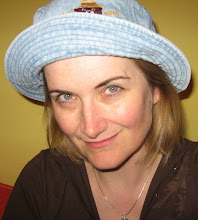Yesterday was my fourth Orthodox Easter. In the US, Easter is one of those holidays like Christmas (Jan 7th) when immigrant Serbs will drive hours to get to a church in the US even if they never attend regular services. If there's no Serb church within, say, four hours driving, then they show up at local Greek churches as guests. It's not the same thing, but at least it's Orthodox.
I was brought up Catholic, so my first Serbian Easter was like nothing I'd ever experienced. The night before we all talked about going to bed early so we could be in the car on time for the long (for us 90 minutes) drive in the morning. Talk is cheap; we all stayed up late anyway. Hey it's Saturday night. As a result, I'm running around freaking out in my nice Sunday Church outfit the next morning on dot of the appointed leave time, and everyone else is still sleeping. One of the kids waves me away with a drowsy, "We don't want to get there on time anyway, it's best to arrive near the end of the service." Huh?!
OK in my world, you get to church ON TIME and sit down in a pew. Then there's the entire service for no more than an hour. Afterwards you shake hands with the priest at the front door and you go home.
In US Serbian immigrant land, you get to church at some point during the service. The precise point is determined by personal preference. Whenever you walk in, your first duty is to buy beeswax candles from the stall at the back of the church which is kept open throughout the service for your convenience. You need two - one to light and stand upright the sandbox for prayers for dead people, and second for prayers for people who are alive. On some holidays you do only one of them, but I always forget and mess it up.
Then you make your way into the main area of the church. There are no pews, nor anyplace to sit except for a handful of chairs on the edges of the room for the extreme elderly. It's just a big open room with everyone standing around listening to the priest. The crowd isn't fixed in place. Newcomers work their way up from the back to see what's going on, or to find a spot in the crowd for their family to stand. Then as they get bored or the crowd shifts, pressing too much, you all shift to another spot. Small children wiggle away from their parents and wander about the room throughout the service. Adults - especially men - slip out for a quick smoke as the need calls. The constant, quiet motion feels like one of those undersea movies of ocean plants waving about in the water.
By the time the service is halfway through, so much standing plus the crowds, candles, and droning service begin to make you feel hot and sleepy. At roughly the 3/4 mark, somebody faints. It's guaranteed. This is a good reason to have brought your cell phone against your parent's expressed desires, as my step-daughter proved one year when that Easter's designated fainter dropped directly in front of her. She called emergency services, several men carried the fainter out to the lawn, and the service carried on without a hitch.
Services in the USA are fairly long, at least two hours, maybe more. I don't know if it's the case in Serbia itself. US priests have the language problem. Depending on how recently their congregation immigrated, they have to say most stuff twice, once in English and once in Serbian. The Cambridge Massachusetts church we go to only does the important stuff -- fundraising notes, key mass points -- in English because most of the congregation arrived in the US after 1990 so they all speak Serb. The Serb church we've been to when visiting Chicago does everything in both English and Serb because so many in the congregation are grandchildren of the original immigrants to that area between WWI and WWII.
When the service is at long last over, you do not get to go home. For most people, especially the more recent immigrants, the real reason for attending happens after the service. Eating, drinking, socializing and yes, music. Serbs take the white bread concept of a church social and turn it into a kick ass party.
All the men, including the priest of course, line up for shots of rakjia while the women busily lay out the feast which includes potatoes, ham, lamb, and wine. Someone else gets the sound system going, with fearful feedback screetches, and starts playing traditional music which sounds like a cross between gypsy music and old fashioned Italian restaurant soundtracks.
This is the music that touches the Serb immigrant soul. Notably it is not remotely pleasurable to visiting Serbs from Serbia itself. They are dismayed, 'You listen to this stuff? I was hoping for some modern music." But, hey, when you're homesick for the old country, only the old classics will do the job.
At last, hours later, you stagger out of the church feasting hall (aka the basement, or on one ill-advised, chilly Easter, a tent set up on the lawn). Exhausted and slightly drunk, this is the moment when you bless god for having provided you with teen-aged children who are too young to drink much, yet old enough to have driver's licenses and be excited by the chance to use them. I usually end up in the back of the car, sleeping my way home in my crumpled Easter outfit.
Experiences of an American woman who was married to a Serb.
Subscribe to:
Post Comments (Atom)

No comments:
Post a Comment